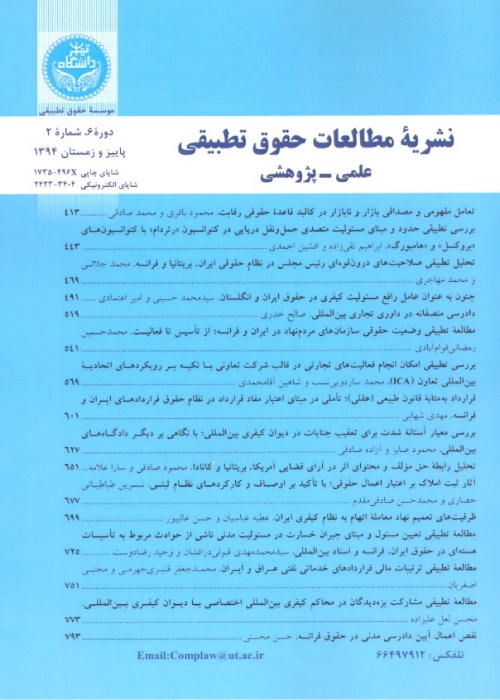A Comparative Study of the Position of the cause in the Contracts of Iran and the New French Law
Although legal doctrines have provided a more conceptual sense of direction, the position of direction cannot be ignored as an essential element in the conclusion of a contract. The French case-law has repeatedly emphasized the need for direction. In the event of a continuing contract, the contract shall be terminated if at any stage of the performance of its obligations in order to remove it. Some jurists see the contract as a dangerous tool in civil law. That is, contractual obligations are precisely distinguished from non-contractual obligations and have a different function. Civil liability is based on restoring the current situation in order to restore the situation. In the event that a person inadvertently uses another's property, compensation is the first guarantee of enforcement. However, contractual obligations are primarily about the future and its dynamic power to change the status quo, and accordingly, German jurists refer to the contract as the king of private law, although French civil law refers to it as a law between the parties. He knows. Direction in the field of contract law has been considered as a means of dangerously restricting the contract, and Iranian civil law and former French law have considered the existence of a directive along with other essential requirements. There are two main functions for the legislators of these two countries: First, it is a means of justifying contractual obligations, in other words it explains the cause and why of the obligation, and we do not seek to justify the plaintiff's willingness to conclude the contract but merely to seek his purpose. We are committed. The contractual direction of the exchange must be crystallized in the form of a contractual exchange, and the objective aspect is that each party considers that the recipient has a right to exchange for itself, which would create a relationship between the borrowers and justify the economic equilibrium of the contract. On the other hand, the binding force of the obligations is also based on such an analysis. Alongside the objective aspect, we see in the irreconcilable contract the vague and glaring aspect of the direction, the person pursuing his property to another without receiving the bastard, excluding the undertaking of the subordinate aims, merely acquiring his exemption. We identify it as a direction. Secondly, it is primarily about trading as a factor limiting contractual freedom. The parties have the necessary and complete freedom to conclude contracts and legal relations, but this freedom is limited to the fact that the public interest and order of the community is not impaired. In the new French law, the principle is the satisfaction of the contract, and the contract derives its power from the agreement between the parties, and the conclusion is that the contract comes from elements such as intent, relevance and specific purpose, and so on. The title of the essential element is not intended, however, in other legal instruments of contract infringement based on the necessity of existence. Traditional and classical views point to orientation as an important pillar of the contract and are concerned about the number of remediation projects that have suggested removal. However, it is important to note that Koch is a necessity in contract law because judicial security is provided by this. However, others believe that this security will be maintained with regard to the contractual interest anyway, and traditionally every person tries to maintain his or her interests in contractual relations with others., it should be said that by accepting the direction, the cause of the wrong effect on the essential characteristics and the guarantee of the nullity of the contract, and the ineffective character of the ineffective personality associated with the free contract and its nullity, can be justified. In the first case, the contract direction is confused but in the latter case the contract direction remains unaffected. Iranian law can be recognized as a progressive and advanced law by adopting French law and adhering to the principles of Islamic law. Commitment is not considered as one of the basic requirements in contract formation and Article 190 of the Civil Code deals with the transaction. Therefore, I, as a whole, has not been the legislator as one of the essential requirements in the formulation of the contract in question, and only if it stipulates the legality of the contract is a condition of validity and a factor in the influence of the contract.
- حق عضویت دریافتی صرف حمایت از نشریات عضو و نگهداری، تکمیل و توسعه مگیران میشود.
- پرداخت حق اشتراک و دانلود مقالات اجازه بازنشر آن در سایر رسانههای چاپی و دیجیتال را به کاربر نمیدهد.



